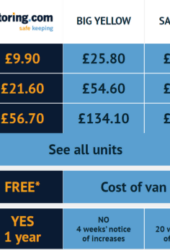Find out how to cut the costs of your startup so that you can put more money into growing the business.
Cash is not the top priority for a startup, but that doesn’t mean that it isn’t important. You can be as creative and innovative as you like, but you need at least some cash to grow the business.
The good news is that startup costs can be dramatically decreased with a few savvy choices, including these:
Cut The Cost Of Your Workplace
You could try working from a cheap self storage unit, or at the very least, work from home. Many remote workers also like to work in a place that offers hot-desking, or for less money, they spend time working in cafes. If you do choose to work in a cafe, be mindful of independent cafes that cannot afford to have you buy one drink and then sit working for hours. Ideally, you can work in a more commercial coffee shop where you won’t have as much of an impact by stretching out your beverages.
Whatever your chosen working option is, it means avoiding the cost of an office rental, which can suck up a lot of money for very little in return. Virtual offices are also a great idea if you want a sense of placement without the cost of an office rental. These kinds of arrangements can also come with a limited use of physical office spaces, so you can benefit from a professional meeting room for client meetings without having to pay for long-term office rentals.
Budget
Many startups go wrong because there is no budget in place at all. There is sometimes a sense of frenzy in ‘doing business’ without any of the paperwork being done, which can kill a business quickly out of nowhere. This is often the case with passion projects where a lot of emotions are spinning around, with very little practical thought until sometimes, it is too late.
By budgeting and keeping track of all your expenses you will be able to forecast issues with income, and hopefully, make changes to avoid those issues being catastrophic.
Outsource
It is a common business mistake to try and do everything yourself when you start up. You might simply be burning the candle at all ends trying to make the business a success by doing every job yourself.
Sometimes you need to get certain tasks outsourced to free up your time so you can focus on growth. Good examples of jobs you can outsource include; blog writing, website design, data entry and even video content production. You can cheaply and easily have these kinds of jobs done by freelancers on sites like People Per Hour, Upwork, Fiverr and FiveSquid. Additionally, by outsourcing you help yourself to avoid burnout, which can be a real problem for small business owners. It can lead you to not only struggle to run your business, but to potentially burn out so much that you are unable to continue with your business efforts at all. Don’t be afraid to share the load – the healthiest, happiest version of you is the one most able to make this business a success.
Trial Periods
Trial periods of anything from equipment use, to technology programmes and even business apps are useful when you are a startup because they usually mean reduced rates or even free use of the services. Being savvy about these trial periods can save you a lot of money in those first six months and perhaps longer if you take advantage of introductory offers too.
Never Buy New
Whether you need a van to make deliveries, or you want a printer for fulfilment and posting, there is always a bargain to be had in the world of second hand. This is so handy as a startup because you might be trialling new methods of production, you could be on a very strict budget, you could even be considering whether or not a startup is even viable for you. Rather than splashing out a ton on new equipment and furniture, use online selling sites so you never go too far out of pocket. Anything you no longer use, sell on those same sites and bank the money back for the business.
Try Dropshipping
Depending on the type of business that you have, dropshipping could be a great way for you to start your brand without tons of overheads. For creatives, especially, dropshipping is ideal. You simply use the dropshipping service you like, then customer orders for a site like Etsy, for example, go through to them and they print your design onto paper, clothing or white goods like mugs and then send the order out for you. They do take some of the profit, of course, but they also save you lots of effort and also prevent you from needing to have lots of stock created before you’re even sure it will sell.
Market For Free As Much As You Can
Marketing is expensive and can eat into the budget of a startup, be it digital marketing or print marketing, there are always costs involved. Although some marketing will take up some of the budget, you can also make some great connections with free marketing. Free influencer marketing from small time influencers who will mention your product in return for a freebie, social media engagement, sending emails to your current email customer list – these are all highly effective forms of marketing that cost very little, and that take very little effort, too. Additionally, strategic link building can also be a valuable avenue for boosting your online presence and traffic.
How Will You Cut Down Your BusinessStartup Costs?
With the above tips you are well on your way to keeping your costs down as a startup. It can be challenging, but effective budgeting and cost-cutting so early on can ensure your business is able to survive through this challenging early stage of growth.
Hopefully, with the saving suggestion above, clever management and a little bit of luck, you’ll be one of the startup success stories of this year and beyond.





